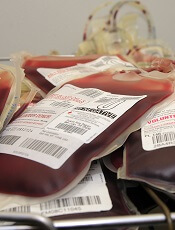
Photo courtesy of UAB Hospital
The US Food and Drug Administration (FDA) has issued a new guidance recommending the deferral of blood donors who have been to areas with active Zika virus transmission, may have been exposed to the virus, or have had a confirmed Zika virus infection.
In areas of the US without active Zika virus transmission, the FDA recommends that donors at risk for Zika virus infection be deferred for 4 weeks.
Individuals considered to be at risk include those who have had symptoms suggestive of Zika virus infection during the past 4 weeks, those who have had sexual contact with a person who has traveled to or resided in an area with active Zika virus transmission during the prior 3 months, and those who have traveled to areas with active transmission of Zika virus during the past 4 weeks.
In areas of the US with active Zika virus transmission (at present, the Commonwealth of Puerto Rico, the US Virgin Islands, and American Samoa), the FDA recommends that whole blood and blood components for transfusion be obtained from areas of the US without active transmission.
Blood establishments may continue collecting and preparing platelets and plasma if an FDA-approved pathogen-reduction device is used.
The FDA’s guidance also recommends that blood establishments update donor education materials with information about the signs and symptoms of Zika virus and ask potentially affected donors to refrain from giving blood.
“Based on the best available evidence, we believe the new recommendations will help reduce the risk of collecting blood and blood components from donors who may be infected with the Zika virus,” said Peter Marks, MD, PhD, director of the FDA’s Center for Biologics Evaluation and Research.
There have been no reports to date of Zika virus entering the US blood supply. However, the risk of blood transmission is considered likely based on the most current scientific evidence of how Zika virus and similar viruses (flaviviruses) are spread and recent reports of transfusion-associated infection outside the US.
Furthermore, about 4 out of 5 people infected with Zika virus do not become symptomatic. For these reasons, the FDA is recommending that blood establishments defer blood donations in accordance with the new guidance.
The FDA also intends to issue a guidance that will address appropriate donor deferral measures for human cells, tissues, and cellular and tissue-based products, given recent reports of sexual transmission of the Zika virus.
In addition, the FDA is prioritizing the development of blood screening and diagnostic tests that may be useful for identifying the Zika virus, preparing to evaluate the safety and efficacy of investigational vaccines and therapeutics that might be developed, and reviewing technology that may help suppress populations of mosquitoes that can spread the virus.


